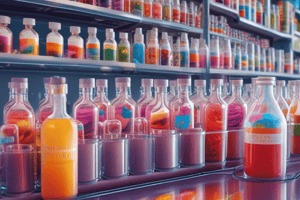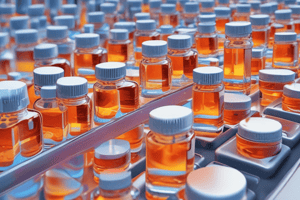Podcast
Questions and Answers
What is the key role of the regulatory code, particularly the adherence to the standards set forth in the pharmacopoeia, for the pharmaceutical industry?
What is the key role of the regulatory code, particularly the adherence to the standards set forth in the pharmacopoeia, for the pharmaceutical industry?
- To ensure the discovery of new drugs
- To maintain high standards of safety, efficiency, and consistency (correct)
- To increase profitability of pharmaceutical companies
- To promote innovation in drug development
Which regulatory body in the United States sets the rules for the production and distribution of pharmaceuticals?
Which regulatory body in the United States sets the rules for the production and distribution of pharmaceuticals?
- The European Medicines Agency (EMA)
- The United States Pharmacopeia (USP)
- The Food and Drug Administration (FDA) (correct)
- The World Health Organization (WHO)
What is the purpose of quality control measures implemented throughout the pharmaceutical industry?
What is the purpose of quality control measures implemented throughout the pharmaceutical industry?
- To reduce costs of drug production
- To ensure profitability of pharmaceutical companies
- To promote innovation in drug development
- To ensure the safety and effectiveness of pharmaceutical products (correct)
Which of the following is not a key step in the drug development process?
Which of the following is not a key step in the drug development process?
Which pharmacopoeia is mandated for use when requesting marketing authorization in the European Union?
Which pharmacopoeia is mandated for use when requesting marketing authorization in the European Union?
What is the primary purpose of the pharmacopoeia in the pharmaceutical industry?
What is the primary purpose of the pharmacopoeia in the pharmaceutical industry?
What is the first step in drug development?
What is the first step in drug development?
What is the role of pharmacopoeial standards in drug manufacturing?
What is the role of pharmacopoeial standards in drug manufacturing?
Who decides whether a drug can be approved for widespread use?
Who decides whether a drug can be approved for widespread use?
What do pharmacopoeias establish guidelines for in relation to pharmaceuticals?
What do pharmacopoeias establish guidelines for in relation to pharmaceuticals?
Why is regulatory compliance important in the pharmaceutical industry?
Why is regulatory compliance important in the pharmaceutical industry?
What is the purpose of quality control processes in pharmaceutical manufacturing?
What is the purpose of quality control processes in pharmaceutical manufacturing?
Flashcards are hidden until you start studying
Study Notes
Pharmaceutical Industry and Pharmacopoeia: Ensuring Drug Safety and Consistency
Overview
The pharmaceutical industry is a global enterprise responsible for the discovery, development, production, and distribution of medical treatments and vaccines. Its success depends on maintaining high standards of safety, efficiency, and consistency. One cornerstone of this process is the regulatory code, particularly the adherence to the standards set forth in the pharmacopoeia.
Regulatory Compliance
Regulation is essential to maintain the highest possible standard for the pharmaceutical industry. In the case of the United States, the Food and Drug Administration (FDA) sets the rules for the production and distribution of pharmaceuticals. Adherence to these regulations ensures that the products produced are safe and effective for consumers. Additionally, the industry is subject to the standards laid out in various pharmacopoeias, such as the US Pharmacopeia (USP) and the European Pharmacopoeia (EP).
Quality Control in Pharmaceuticals
Quality control measures are implemented in every aspect of the pharmaceutical industry, from the selection of raw materials to the final product. The European Union, for instance, mandates the use of the Pharmacopoeia Europa (Ph.Eur.) standards when requesting marketing authorization in EU member states.
Drug Development
Drug development is a complex, multi-step process. It starts with preclinical trials, during which potential drug candidates are tested for safety and effectiveness in controlled lab environments. Once a candidate passes these tests, it moves on to clinical trials, involving human subjects. Based on the results of these trials, regulatory bodies decide whether or not to approve the drug for widespread use.
Drug Manufacturing Processes
Manufacturing pharmaceuticals involves careful adherence to guidelines and protocols, including those laid out in pharmacopeias. These standards ensure consistency and quality throughout the manufacturing process, ensuring that patients receive safe, reliable treatments.
Pharmacopoeial Standards
Pharmacopoeia standards play a crucial role in maintaining the safety and consistency of pharmaceuticals. They establish guidelines for test methods, reference materials, and quality control measures. Pharmacopoeias from around the world collaborate with regulatory bodies, health authorities, industry, and other stakeholders to keep these standards current and relevant.
In conclusion, the pharmaceutical industry's adherence to regulatory compliance, use of pharmacopoeial standards, and commitment to quality control processes are essential components of ensuring patients receive safe and effective treatments. The ongoing collaboration between various organizations ensures that these standards remain aligned with scientific advancements and public health priorities.
Studying That Suits You
Use AI to generate personalized quizzes and flashcards to suit your learning preferences.




